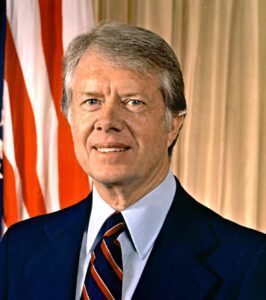
My first encounter with the 39th President came just two months into his presidency at a meeting in the Cabinet Room at the White House in March, 1977 almost 48 years ago. As a career State Department Foreign Service Officer with six years experience in Vietnam, I had been selected to be a member of the first post-war mission President Jimmy Carter was sending to Hanoi to begin to heal the deep division in our country from the Vietnam War.
We were to do so by alleviating the pain and suffering of the families of the more than 2,500 American military personnel who were still missing and unaccounted for in Indochina. As the President commanded the room, I reflected on how his improbable journey to the White House had begun in the Iowa Caucus in my home state.
I had the opportunity over the next several years to observe that President Carter’s inner motivation to alleviate human suffering was matched only by his drive to promote peace. As special assistant to Ambassador Richard Holbrooke at the State Department, I was privy to the details as the decision was taken to alter 30 years of foreign policy by establishing diplomatic relations with the People’s Republic of China.
In October 1979, I traveled to Beijing with a delegation of American governors, that included Iowa Governor Robert Ray, as part of that Carter Administration’s transformational diplomatic achievement, which would lead to President Xi Jinping’s unique relationship with the state of Iowa.
That Iowa connection continued after he left the White House when in 1986 now former president Jimmy Carter traveled to Africa as part of a delegation that included Nobel Peace Prize Laureate and Iowa native Dr. Norman E. Borlaug, considered the “Father of the Green Revolution.” The goal was to begin the process to bring that same agricultural transformation to
that continent.
To pursue that great humanitarian goal of ending global hunger, a few months later Borlaug founded the World Food Prize. Former President Carter became the first member of his Council of Advisors, traveling to Iowa on several occasions. Borlaug would subsequently join in nominating Carter for the Nobel Peace Prize, which he received in 2002. In my role as President of the World Food Prize, I had the enormous privilege to solicit Nobel Peace Prize Laureate Jimmy Carter’s input as a member of the Council of Advisors on critical issues about eradicating hunger and poverty particularly in Africa, when we
were choosing our first World Food Prize recipient from Africa.
My conclusion from all of those experiences is that Jimmy Carter’s reserved, almost self-effacing demeanor in the initial Iowa Caucus, is overridden by his heroic legacy reflecting his deep personal concern about, and multiple successful efforts to, “alleviate human suffering and promote peace.”
————————————————–
A career Foreign Service Officer, Kenneth Quinn served as U.S. Ambassador to Cambodia from 1996-99. From January of 1977 to 1979, he was Special Assistant to Amb. Richard Holbrooke at the State Department as part of the Carter administration.

